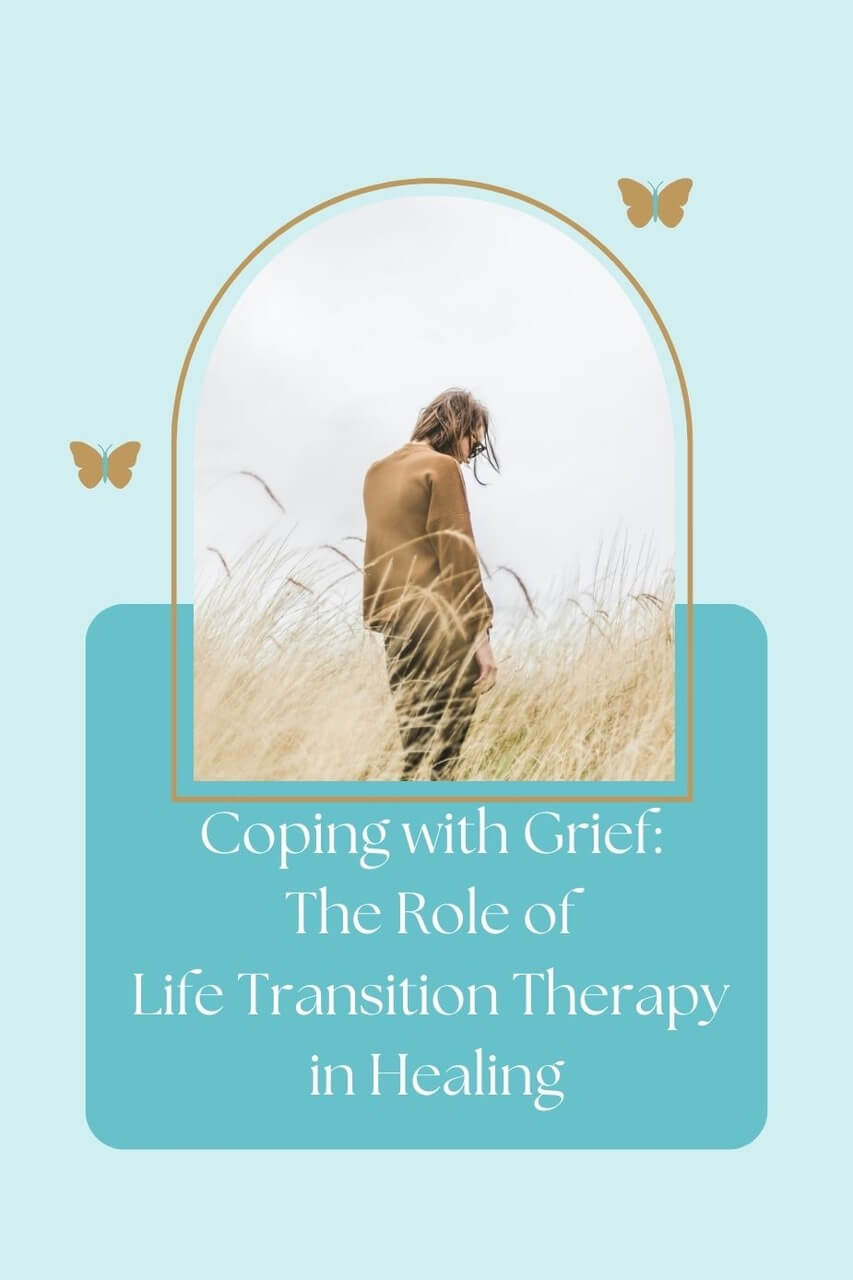Experiencing the loss of a loved one is one of the most challenging parts of life. Everyone grieves differently, and understanding how to cope with loss can be essential for healing. This blog explores the role of life transition therapy in coping with loss and provides information on grief and its symptoms, as well as holistic and somatic techniques to support healing.

Understanding Grief
Grief is the natural response to losing someone or something important to us. It can cause a range of emotions, from sadness and anger to confusion and fear. Knowing the different types of grief can help us understand our feelings better.
Types of Grief
Normal Grief
This type of grief includes feelings like sadness, anger, and yearning. These emotions come and go and gradually lessen over time. Normal grief is a process that can take months or even years to work through, and it involves adjusting to life without a loved one.
Complicated Grief
Sometimes, grief can last a long time and make it hard to carry on with daily life. This is called complicated grief. It might feel like you’re stuck in a state of mourning. Complicated grief can make it hard to function normally, and you might feel like the pain of loss is overwhelming and unending.
Disenfranchised Grief
This type of grief happens when your loss isn’t openly acknowledged or socially supported. For example, losing a pet or a job might not get the same support as losing a close family member. Disenfranchised grief can also occur in cases of divorce, miscarriages, or the loss of a friend. Because these types of losses are not always recognized by society, people might feel isolated or invalidated in their grief.
Anticipatory Grief
Anticipatory grief happens when you know a loss is coming. This can occur when a loved one is diagnosed with a terminal illness. You start to grieve before the actual loss happens. Anticipatory grief can involve many of the same emotions as normal grief, but it also includes the stress and anxiety of anticipating the loss.
Secondary Loss
This type of grief includes the additional losses that happen as a result of the primary loss. For example, after the death of a spouse, you might also experience the loss of financial stability, social connections, or a sense of identity. These secondary losses can compound the feelings of grief and make the healing process more complex.

Symptoms of Grief
Grief can affect us in many ways. Here are some common symptoms:
Emotional Symptoms
Grief often brings a wave of emotions, which can be overwhelming and change quickly. These include:
- Sadness: Deep sorrow is the most common and expected emotion. It can feel all-consuming and persistent.
- Anger: You might feel anger at the situation, the person who passed away, yourself, or others. This is a normal reaction.
- Guilt: You might have regrets or feel responsible for things you did or didn’t do. Guilt can be a heavy burden during grief.
- Anxiety: Worrying about the future or feeling uncertain about how to cope without your loved one is common.
- Relief: Especially if the loved one is suffering, you might feel relief, which can sometimes lead to feelings of guilt.
Physical Symptoms
Grief can take a toll on your body, leading to physical symptoms such as:
- Fatigue: Feeling tired all the time, even if you get enough sleep.
- Trouble Sleeping: Insomnia or disrupted sleep patterns are common. Some people might sleep more than usual as a way to escape their grief.
- Changes in Appetite: You might lose your appetite or, conversely, eat more than usual for comfort.
- Aches and Pains: Physical pain, such as headaches, stomachaches, or muscle tension, can accompany grief.
Behavioral Symptoms
Grief can influence how you act, including:
- Withdrawal: Pulling away from social activities or isolating yourself from friends and family.
- Forgetfulness: Finding it hard to remember things or concentrate on tasks.
- Restlessness: Feeling antsy and unable to sit still, or the opposite, feeling lethargic and unable to do anything.
Cognitive Symptoms
Grief can also affect your thinking and perception:
- Difficulty Concentrating: Finding it hard to focus on work, school, or daily tasks.
- Confusion: Feeling disoriented or having trouble making decisions.
- Disbelief: Struggling to accept that the loss has occurred, feeling like it isn’t real.

Holistic and Somatic Techniques
Working with grief holistically means addressing the whole person – mind, body, and spirit. Here are some techniques that can help.
Mindfulness and Meditation
What it Addresses: Emotional symptoms and anxiety.
How to Do It: Spend a few minutes each day sitting quietly and focusing on your breath. Notice your thoughts and feelings without judging them. This can help you feel calmer and more present.
Examples:
- Guided Meditations: Use apps like Calm or InsightTimer (my personal fave!) to help guide you through mindfulness practices.
- Body Scan Meditation: Focus on each part of your body, noticing any tension or discomfort and releasing it.
Yoga and Movement
What it Addresses: Physical symptoms and restlessness.
How to Do It: Gentle yoga stretches or even a walk outside can help release tension and improve your mood. Pay attention to how your body feels and move in a way that feels good to you.
Examples:
- Restorative Yoga: This type of yoga uses props to support your body in restful poses, helping you to relax deeply.
- Walking in Nature: Walking in a park or by the beach can be soothing and help you feel connected to the world around you.
Journaling
What it Addresses: Cognitive symptoms and confusion.
How to Do It: Write down your thoughts and feelings about your loss. You can write about memories, how you’re feeling today, or your hopes for the future. This can help organize your thoughts and provide an emotional outlet.
Examples:
- Gratitude Journal: Write down things you are grateful for each day, which can help shift your focus to positive aspects of life.
- Memory Journal: Create a journal dedicated to memories of your loved one, including photos, stories, and letters.
Creative Expression
What it Addresses: Behavioral symptoms and emotional pain.
How to Do It: Engage in activities like painting, drawing, or playing music. These activities can help you express emotions that might be hard to put into words.
Examples:
- Art: Use painting, drawing, or sculpting to explore and express your feelings.
- Music: Listening to or playing music that resonates with your emotions can be very healing.
Somatic Based Therapies
What it Addresses: Physical and emotional symptoms.
How to Do It: Work with a therapist trained in somatic therapy. They can guide you through exercises that help release stored tension and trauma from the body.
Examples:
- Grounding Exercises: Techniques that help you connect with the present moment, such as feeling your feet on the ground or holding a comforting object.
- Breathwork: Controlled breathing exercises that help regulate your nervous system and promote relaxation.
Find Compassionate Support for Your Grief
Grieving is a personal journey, but you don’t have to go through it alone. Life transition therapy can offer a safe space to explore your feelings and find ways to cope. Marilyn Ashley, LMFT, specializes in helping people through life changes and loss. If you need support, reach out to Marilyn for compassionate and professional guidance. For personalized guidance and support, contact Marilyn Ashley, LMFT, who specializes in holistic therapy approaches to help you manage grief and loss. She offers a holistic approach to therapy that can support you through your healing journey. Reach out today to start your path toward healing.
Begin Healing From Your Grief With Life Transitions Therapy in Hermosa Beach, CA and Manhattan Beach, CA
Are you struggling to navigate the overwhelming emotions of grief? Our compassionate life transition therapy can provide the support and guidance you need to heal and move forward at Marilyn Ashley, LMFT. Take the first step towards finding peace and reclaiming your life by following these three simple steps:
- Schedule Your 20-Minute Complimentary Phone Consultation
- Learn More About Me and My Services
- Start healing from your grief
Other Services Offered By Marilyn Ashley, LMFT
At my Hermosa Beach, CA practice, Life Transition Therapy is just one of the services I offer to help you cope with your grief. I also specialize in Anxiety Therapy, Trauma, and Couples Therapy. For your convenience, I offer in-person sessions in my beautiful Hermosa Beach office, which may clients comment on how calming it is and how grounded, content, and serene they feel there. I also offer online therapy sessions for those located in Manhattan Beach, CA, and anywhere else in California. By incorporating holistic practices into your daily life, you can support your overall well-being. I’m excited to work with you on your journey towards healing and growth. Together, let’s embrace your anxiety and learn how to thrive, not just survive! Check out my blog for more about holistic healing!

Hi there!! I’m Marilyn. I empower individuals to embrace their true selves, heal holistically and flourish. I provide in-person therapy in Hermosa Beach, California and the greater South Bay area as well as online therapy throughout California, Colorado, Florida, Kansas and South Carolina. Click here to get started.

